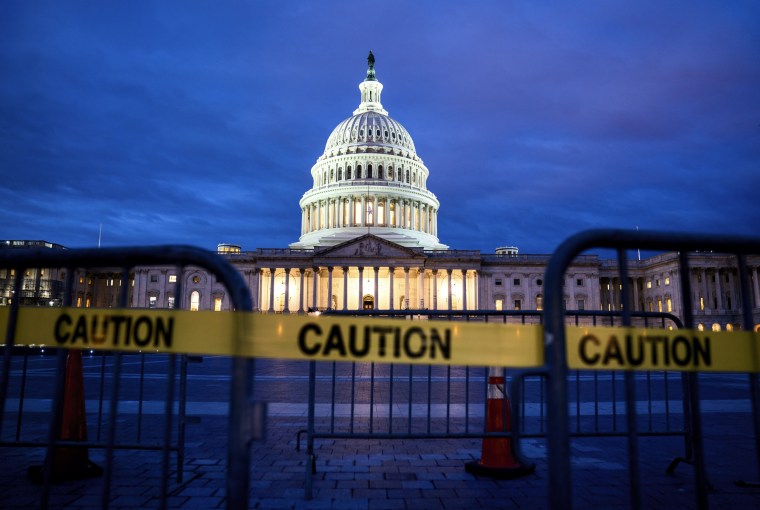WASHINGTON — The partial government shutdown stretched into its sixth day Thursday, but there was little sense of urgency on Capitol Hill to resolve the impasse as Congress reconvened for a pro-forma session that ended as quickly as it began.
With no votes scheduled in either chamber and no sign of serious negotiations between the parties, the shutdown is now widely expected to continue into the New Year, when the incoming Democratic House majority will have a stronger hand to deal with President Donald Trump and his demand for a border wall with Mexico.
The still-Republican controlled House was gaveled into session for less than two minutes as Rep. Jim McGovern, D-Mass., yelled out in a futile attempt to make a motion, before being quickly shut down in an otherwise empty House chamber.
The Senate likewise met for a brief pro-forma session before going into recess until New Year’s Eve.
On Twitter, President Donald Trump railed against “Democrats OBSTRUCTION of the desperately needed Wall,” a day after delivering a similar message during a surprise visit to U.S. troops in Iraq.
And his re-election campaign sought to get something out of the impasse, texting and emailing supporters to ask them to “Donate to be an Official Build the Wall Member.”
“The Administration understands this crisis and made a reasonable, common-sense solution to Democrats five days ago — we've not received a single response,” White House Press Secretary Sarah Sanders said in a statement. “The only rational conclusion is that the Democrat Party is openly choosing to keep our government closed to protect illegal immigrants rather than the American people. The President does not want the government to remain shut down, but he will not sign a proposal that does not first prioritize our county’s safety and security.”
Democrats have shown no interest in conceding to Trump’s insistence that any new government funding bill include $5 billion for his border wall.
Instead, they seem content to wait until Jan. 3, when their new majority in the House will take hold and they can pass a more favorable funding bill or reopen negotiations with a stronger hand — although any House measure would still need to be passed by the Senate and signed into law by President Trump.
"Democrats have offered Republicans three options to re-open government that all include funding for strong, sensible, and effective border security — but not the President's immoral, ineffective and expensive wall," Drew Hammill, spokesperson for Rep. Nancy Pelosi, D-Calif., who is expected to be elected speaker, said in a statement. "With the House Majority, Democrats will act swiftly to end the Trump Shutdown, and will fight for a strategic, robust national security policy, including strong and smart border security, and strong support for our service members and veterans."
Pelosi herself has pointed to the expected shift in the negotiating dynamic as Democrats prepare to assume the House majority. “He's already backed off of the cement — now he's down to, I think, a beaded curtain or something,” she said of the border wall in an interview this week with USA Today.
The outgoing Republican majority is laying relatively low as well, with many lawmakers remaining back home for the Christmas break and few returning to Washington Thursday.
Majority Whip Rep. Steve Scalise, R-La., whose job it is to make sure members show up for votes, advised lawmakers Thursday that “no votes are expected in the House this week,” and kicked the ball back into the Senate’s court.
At the tail end of a holiday week, the Capitol complex’s marble halls were deserted, its subways ran empty, and by noon, a stack of newspapers remained uncollected outside Senate Majority Leader Mitch McConnell’s door.
"If I were them, and I were leaving, I wouldn't want to leave a mess behind," McGovern said of the outgoing GOP majority in an interview off the House floor. "They seem totally content to leave this place in total chaos."
Government shutdowns, once seen as a major crises, have become more common, with three this year alone — with the impact of the current stoppage limited by the fact that it involves just nine government departments, with some critical agencies such as the Department of Defense fully funded by a previous bill.
Experience with past shutdowns has lessened the effect on the public as well, with workarounds already established, such as having states foot the bill for National Park staffing while the government is not fully operating.
The biggest impact may be on government employees, hundreds of thousands of whom have either been furloughed or forced to work without pay, along with federal contractors who perform services like cleaning the Smithsonian museums.
But the plight of bureaucrats, who tend to be far from the most politically sympathetic group of Americans, does not appear to be much motivation for politicians to resolve the conflict.
"Do the Dems realize that most of the people not getting paid are Democrats?" the president tweeted Thursday morning, without offering evidence to support his claim.

